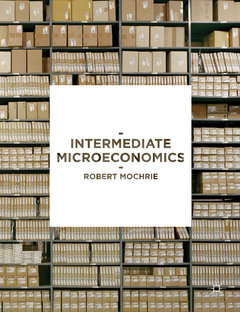Description
Intermediate Microeconomics, 1st ed. 2015
Author: Mochrie Robert
Language: English
Subject for Intermediate Microeconomics:
Support: Print on demand
Withdrawn from sale
Description
/li>Contents
/li>Biography
/li>Comment
/li>
This innovative textbook contains everything students need to know on an intermediate microeconomics course. Combining classic theory and models with the latest developments, it gently guides learners through the topics and helps them to become increasingly independent. Mathematical understanding is a crucial part of mastering the subject, but can be tricky to obtain. Consequently, numerical tools and engaging exercises are expertly woven into the broader, conceptual discussion of economic theory. This process is progressive and incremental, with steps explained in great detail in the opening chapters to help students gain mathematical fluency and confidence.
A microeconomics textbook that is essential reading for any intermediate level course at university. Although primarily aimed at two-semester undergraduate modules, the comprehensive and accessible writing style means that it is also suitable for certain postgraduate and one-semester courses. The author provides helpful notes on how to adapt the book to your course.
- Relates microeconomic principles to real situations by using recognizable examples from everyday life, such as coffee shops, bakeries and train operators
- Balances a mathematical approach with verbal and graphical explanations of ideas to aid understanding
- Introduces theory and analytical techniques together to help students make and evaluate economic arguments and think like economists
- Adopts a problem-solving approach through the By yourself boxes to help students fully engage
- Covers the standard theory and models, but also integrates exciting contemporary topics such as behavioural economics and game theory- Includes a comprehensive companion website with a testbank, manual and PowerPoint slides for lecturers, and a solutions manual, essay bank, multiple choice questions and glossary for students
These books may interest you

Microeconomics, Global Edition 101.10 €



